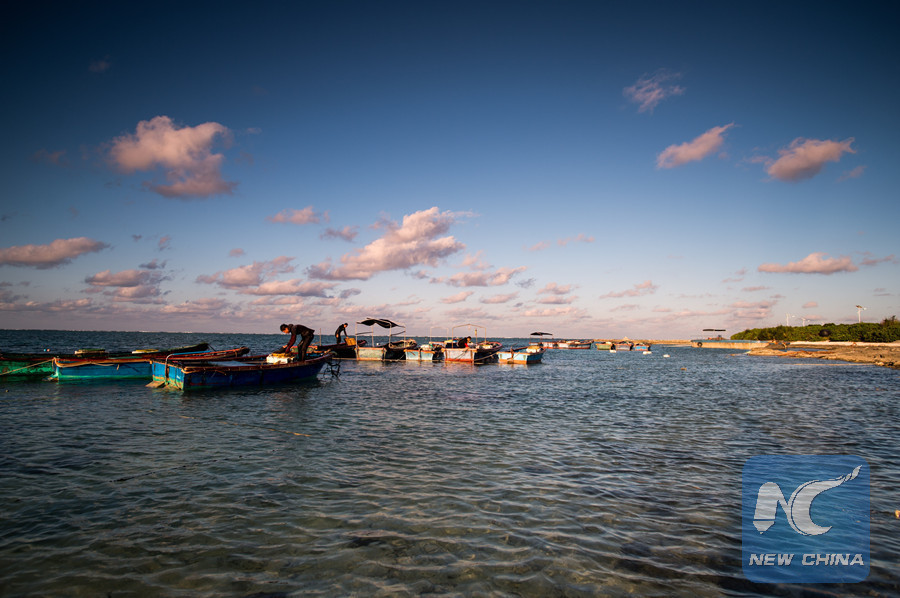


This photo taken on Dec. 11, 2015 shows uniquely beautiful winter scenery of the Zhaoshu Island in the South China Sea. (Xinhua file photo/Zhao Yingquan)
BEIJING, July 5 -- With a so-called "international arbitration" to be decided by the Arbitral Tribunal on the South China Sea, more and more countries around the world have expressed support for China in the arbitration unilaterally initiated by the Philippines and for China's stance on the South China Sea disputes.
ARBITRAL TRIBUNAL'S JURISDICTION
The real nature of the dispute between China and the Philippines over the South China Sea is about territorial sovereignty, which is beyond the jurisdiction of an arbitral tribunal.
Stefan Talmon, director of the Institute of Public International Law at the University of Bonn, said in a paper published recently that despite the Philippines' claims about issues such as "traditional fishing rights," the "actual controversy" in the case is about territorial sovereignty.
The Hague-based Arbitral Tribunal on the South China Sea, established at the unilateral request of the Philippines, has no jurisdiction over the case, as disputes over territorial sovereignty are not governed by the United NationsConvention on the Law of the Sea (UNCLOS), Talmon said.
"MOUTHPIECE" FOR CERTAIN GROUPS
China believes the arbitral tribunal is "only a mouthpiece for certain groups," as "it is strange that he (Paul Reichler) seems to know what the ruling will be even before there is one."
Reichler, the Philippines' chief lawyer on the international arbitration of the South China Sea disputes, said in an interview with Reuters recently that China risks being seen as an "outlaw state" unless it respects the outcome, and expected the tribunal will award in favor of the Philippines.
Shannon Ebrahim, a well-known South African commentator, said on Friday that U.S. intervention in the South China Sea issue has aimed to serve its purpose to impede China's rise.
This strategic waterway has turned into a game of chess between China and some of its neighbors along the South China Sea, which have made a series of territorial claims and are backed by the United States, Ebrahim said.
Sam Bateman, an Australian expert on maritime security, said, "I believe the United States has complicated the situation in the South China Sea," referring to the U.S. move of sending warships to the South China Sea to conduct its self-styled freedom of navigation patrols.
DIRECT NEGOTIATION ONLY WAY
"Pacta sunt servanda" -- or maintaining agreements -- is a basic principle in international law. However, the Philippines' unilaterally initiation of the arbitration violates its agreement with China to resolve any dispute through bilateral negotiations.
On the basis of bilateral agreements and the Declaration on the Conduct of Parties in the South China Sea (DOC), China and the Philippines have chosen negotiation as the means to resolve their disputes rather than arbitration.
The Philippines' initiation of the arbitration without obtaining China's consent contravenes its international obligations to China.
Cambodian Prime Minister Samdech Techo Hun Sen said on Monday that the ruling Cambodian People's Party considered the arbitral tribunal's upcoming decision as "the worst political collusion in the framework of international politics," the result of which would lead to division among members of the Association of Southeast Asian Nations (ASEAN) themselves and between ASEAN and China.
Day|Week

 China's first intelligent security robot debuts in Chongqing
China's first intelligent security robot debuts in Chongqing A Total of 3,552 Subscribers Vanish In Two Days; YouTube Closes All Doors to Users’ Inquiries
A Total of 3,552 Subscribers Vanish In Two Days; YouTube Closes All Doors to Users’ Inquiries Out of this world! Futuristic UFO-shaped yacht has its own garden and a stunning underwater viewing deck
Out of this world! Futuristic UFO-shaped yacht has its own garden and a stunning underwater viewing deck An old tea house in Chengdu
An old tea house in Chengdu Furious Customer Crushes All the Buns from Vendor Just Because He Was Given the Wrong Flavor
Furious Customer Crushes All the Buns from Vendor Just Because He Was Given the Wrong Flavor 20 post-90s couples hold ’naked marriage‘ in E. China
20 post-90s couples hold ’naked marriage‘ in E. China Female official wearing traditional Han costume to promote local tourism
Female official wearing traditional Han costume to promote local tourism Over 12,000 Runners Seek Medical Care in S China’s Marathon
Over 12,000 Runners Seek Medical Care in S China’s Marathon Six Luxury Sports Cars Totaled after Fail Attempts to Cross China’s Most Perilous Highway Linking SW China’s Sichuan and Tibet
Six Luxury Sports Cars Totaled after Fail Attempts to Cross China’s Most Perilous Highway Linking SW China’s Sichuan and Tibet Incredible Transformation: “Witch Child”Whose Parents Left Him for Dead in Nigerian Makes Speedy Recovery
Incredible Transformation: “Witch Child”Whose Parents Left Him for Dead in Nigerian Makes Speedy Recovery